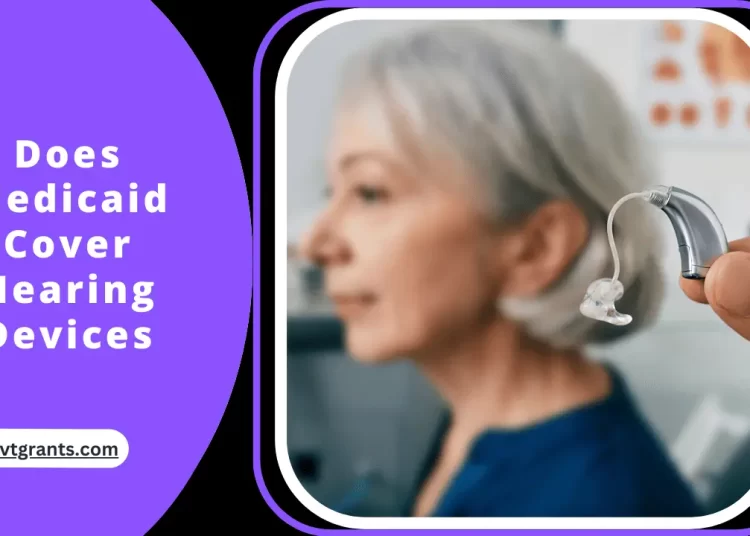Does Medicaid Cover Hearing Devices Aid ? List of States That Cover Hearing Devices – Hearing loss is a prevalent issue that impacts millions of individuals across the United States of America. Nearly 15% of adults in America have difficulty hearing as per reports of the National Institute on Deafness and Other Communication Disorders. Untreated hearing loss impacts one’s quality of life, leading to depression, isolation feelings, and reduced cognitive function. Those facing this challenge often wonder: ‘Will Medicaid cover hearing aids’? And what are the states that cover hearing devices?’
Fortunately, Medicaid provides coverage that helps people manage the cost of hearing devices. When it comes to assessing your hearing aids, understanding the specific coverage provided by Medicaid or your individual hearing insurance plans is significant. In this guide, we will help you delve with the following important topics:
- Will Medicaid cover hearing aids?
- What are the states that cover hearing devices?
- What are the different types of hearing aids covered by Medicaid?
- Does Medicare cover hearing aids?
- What are the other insurance companies that cover hearing aids?
Highlights of this Post
Key Takeaways
- Medicaid covers hearing aids for individuals under 21 in all states, with varying levels for adults; approximately 20 states offer some degree of adult hearing device coverage.
- Coverage specifics, such as eligibility and extent of aid, vary by state. For example, states like Alaska, California, and Florida provide adult hearing aid support under Medicaid.
- Hearing aids are a significant expense, averaging $4672 per pair in the U.S., which can be a substantial financial burden, especially for those on a fixed income.
- While most traditional medical insurances don’t cover hearing aids, Medicaid, Medicare Advantage, and certain private insurers like United HealthCare and Humana might offer partial or full coverage depending on the plan.
- To access Medicaid for hearing aids, necessary documentation typically includes proof of identity, residency, income, and medical necessity as determined by a licensed audiologist.
What Is A Hearing Aid?
Hearing aids are wearable devices that make sound louder for individuals with different degrees of hearing loss to communicate and hear better in various listening situations. The hearing aid generally consists of a microphone, speaker, and amplifier.
They may come with additional features such as noise reduction, directional hearing for a personalized hearing experience, and tinnitus management. According to reports, one-third of US adults over 65 years suffer from hearing loss, while 50% have hearing loss by the age of 75 years.
What Is The Cost Of Hearing Aids In The USA?
The cost of a pair of hearing aids in America is $4672 on average. Depending on the brand and type of hearing aids, the price may be between $1000 and $8000 for an advanced pair.
Hearing aid loss insurance cost between 10% to 15% of hearing aids’ price. The need for hearing aids are a critical need for those who are living on fixed income. This is especially for those on limited income. However, qualified recipients can get some financial relief with Medicaid coverage.
Are Hearing Aids Covered By Insurance In The US?
Hearing aids are generally not covered by medical insurance. This can be a significant barrier for those who have a hearing loss diagnosis. A few private insurance providers, like Medicaid and Medicare Advantage (Part C) plans, may provide coverage. A few private insurance providers, like Blue Cross Blue Shield, UnitedHealthcare, and Humana, can also provide coverage for hearing aids, either completely or partially, depending on your plan.
Will Medicaid Cover Hearing Aids?
The Medicaid coverage of hearing aids may vary from one state to another. The program provides hearing aid coverage for beneficiaries below 21 years of age in every US state however the coverage for adults may vary with nearly 20 states providing some sort of hearing devices coverage.
The states that cover hearing aids for adults include Alaska, California, Connecticut, Florida and Hawaii. Every state has its own Medicaid coverage policy including the limitation and eligibility criteria.
The program generally covers evaluation, fitting, as well as the purchase of hearing aids for qualified beneficiaries. Following is the list of hearing aid-related items that are not covered by Medicaid in many states.
- Routine maintenance cleaning
- Code and wire replacement
- Hearing aid batteries
- Hearing aid repairs that the manufacturers warranty does not cover
- Hearing aid repairs while the warranty is still active
You can take a look at our next guide to know if you can get pediatric diapers covered by Medicaid.
Does Insurance Cover Hearing Aids For Adults And Children?
Medicaid policy for hearing aid coverage comprises comprehensive support for those who are below 21 years of age through the Early and Periodic Screening Diagnostic and Treatment Program. This plan ensures children get the right diagnostic evaluation, hearing aid fittings, and adjustment free of charge and addresses their hearing loss issues early and effectively.
The extent of Medicaid coverage for hearing aids for adults may vary significantly by location. For instance, in Washington, Medicaid provides benefits for hearing aids that cover the cost of the devices, including the fittings, maintenance, and replacement batteries.
Our next guide will help you learn how to get a free fitbit through Medicaid.
How To Get Hearing Aids Covered By Insurance? A List Of Eligibility Criteria
In the below section of the guideline, we have outlined the basic eligibility criteria that you need to meet to get hearing aids coverage by insurance:
- Must meet certain income limits set by their state’s Medicaid provision.
- The program provides coverage for eligible pregnant women, senior citizens and disabled individuals who can meet the income requirements set by their state Medicaid program.
- Children belonging to low-income families are eligible for the coverage or can also qualify for other programs such as the Children’s Health Insurance Program (CHIP).
- The Medicaid coverage for hearing aids generally requires that the hearing aids are deemed medically necessary as per your health professional. The necessity must be determined through comprehensive hearing evolution that is conducted by a licensed audiologist. For adults, there can be specific criteria that can define their eligibility based on the degree of hearing loss.
- Even though Medicaid is a federal-state program, each state has the flexibility to tailor its benefits and coverage to meet the needs of the residents. For instance, the Medicaid program in Washington is more inclusive and provides broader coverage for hearing aids compared to other states. This also includes support for diagnostic hearing tests and full/or partial coverage for hearing aid costs.
Curious to know how to get a free YMCA membership with medicaid? Read our next guide here.
What Are The Paperwork Needed To Get Medicaid Coverage For Hearing Aids?
Once you fulfill the eligibility criteria for Medicaid coverage for hearing aids, you need to fulfill certain documentation criteria that state the following:
- Social Security number
- Proof of identity in the form of a passport, driver’s license or government-issued ID
- Proof of disability (if applicable).
- Proof of residency in the form of utility bills, lease agreements, mortgage payments, etc.
- Proof of pregnancy (if applicable)
- Proof of disability (if applicable).
You can head to our next guide to know how to get free braces with Medicaid.
How To Apply For Hearing Aids Coverage Through Medicaid?
- The first and foremost step is to confirm the Medicaid eligibility and understand all specific coverage details associated with hearing details by contacting your state Medicaid office.
- The next step is to book a hearing assessment with a Medicaid approved provider and determine your need for hearing aids.
- You need to discuss with your doctor about the type of hearing aids that can be covered and any additional costs or copayments that are involved.
- Before starting the Medicaid application, make sure you have gathered all the relevant documents, like proof of residency, identity, income, and disability.
- Fill out the application form thoroughly and accurately and attach all the supporting documents as required.
- Now submit the application and documents with the local Medicaid office near you. Check with your state’s Medicaid provision for particular instructions on how to submit your application.
Do you want to know whether Medicaid covers Blood Pressure Monitors or not? Read our next blog now.
States That Accept Medicaid Coverage of Hearing Devices
Following is the list of states that may/ may not cover hearing devices through Medicaid:
Alaska (Covered)
Contact: 907-334-2520
Website:https://health.alaska.gov/dpa/Pages/medicaid/default.aspx
California (Covered)
Contact: 800-541-5555
Website:https://www.benefits.gov/benefit/1620
Connecticut (Covered)
Contact: 800-842-1508
Website: https://portal.ct.gov/HUSKY
Florida (Covered)
Contact: 888-419-3456 or 800-955-8771.
Website:https://home.flmmis.com/public/contact/
Hawaii (Covered)
Contact: 800-316-8005
Website:https://medquest.hawaii.gov/en/about/what-is-medicaid.html
Idaho (Covered for children below 21 years)
Contact: 866-686-4752 or 800-926-2588.
Website: https://healthandwelfare.idaho.gov/services-programs/medicaid-health
Illinois (Covered)
Contact: 800-252-8535
Website: https://www.dhs.state.il.us/page.aspx?Item=18012
Indiana (Covered)
Contact: 800-889-9949
Website: https://www.in.gov/medicaid/
Iowa (Covered)
Contact: 800-338-8366
Website: https://dhs.iowa.gov/ime/members
Kansas (Covered)
Contact: 800-766-9012
Website: https://www.kancare.ks.gov/
Massachusetts (Covered)
Contact 800-841-2900
Website:http://www.mass.gov/eohhs/docs/masshealth/appforms/member-booklet.pdf
Minnesota (Covered)
Contact 800-657-3739
Website:https://mn.gov/dhs/people-we-serve/adults/health-care/health-care-programs/programs-and-services/medical-assistance.jsp
Missouri (Covered)
Contact: 573-751-3221
Website https://mydss.mo.gov/healthcare
Montana (Covered)
Contact: 800-362-8312
Website:https://dphhs.mt.gov/montanahealthcareprograms/memberservices
Nebraska (Covered)
Contact: 402-471-9381
Website:https://dhhs.ne.gov/Pages/Medicaid-Eligibility.aspx
Nevada (Covered)
Contact: 800-992-0900 EXT 2
Website https://www.medicaid.nv.gov/
New Hampshire (Covered)
Contact: 603-271-4344
Website:https://www.dhhs.nh.gov/programs-services/medicaid
New Jersey (Covered)
Contact: 800-356-1561
Website:https://www.state.nj.us/humanservices/dmahs/clients/medicaid/
New Mexico (Covered)
Contact: 800-820-6901
Website:https://nmmedicaid.portal.conduent.com/static/index.htm
New York (Covered)
Contact: 800-541-2831
Website:http://www.health.ny.gov/health_care/medicaid/
North Dakota (Covered)
Contact: 800-472-2622
Website:https://www.nd.gov/dhs/services/medicalserv/medicaid/
Ohio (Covered)
Contact: 820-324-8680
Website: https://www.linkedin.com/company/ohiomedicaid
Oregon: (Covered)
Contact 800-527-5772
Website:https://www.oregon.gov/oha/hsd/ohp/pages/apply.asp
Rhode Island (Covered)
Contact: 401-462-0305
Website: http://www.dhs.ri.gov/
South Dakota (Covered)
Contact 605-773-3495
Website:https://dss.sd.gov/medicaid/
Texas (Covered)
Contact 800252826
Website: https://www.hhs.texas.gov/services/health/medicaid-chip
Vermont (Covered)
Contact: 800-250-8427
Website: https://www.greenmountaincare.org/health-plans/medicaid#Hearing%20Aids
Washington (Covered)
Contact: 800-562-3022
Website:https://www.hca.wa.gov/
Wisconsin (Covered)
Contact: 830-362-3002
Website:http://www.forwardhealth.wi.gov/kw/pdf/hearing.pdf
Wyoming (Covered)
Contact 307-777-7531
Website:http://wyequalitycare.acs-inc.com/manuals/Manual_CMS_1500.pdf
States That Does Not Covered Medical Coverage For Free Hearing Devices
Alabama (Not covered)
Contact: 800-362-1504
Website: https://www.medicaid.alabamaservices.org/alportal/Home/tabId/2/Default.aspx
Arizona (Not covered)
Contact: 602-417-5010
Website: http://www.azahcccs.gov/
Arkansas (Not covered)
Contact: 800-482-5431
Website:https://humanservices.arkansas.gov/divisions-shared-services/medical-services/
Colorado (Not covered)
Contact: 303-866-2993
Website: https://www.healthfirstcolorado.com/
Delaware (Not covered)
Contact: 302-255-9500
Website: https://dhss.delaware.gov/dmma/
District of Columbia (Not covered)
Contact: 202-442-8997
Website https://www.dc-medicaid.com/dcwebportal/nonsecure/medicaidAndMe
Georgia (Not covered)
Contact: 404-656-4507
Website https://medicaid.georgia.gov/
Kentucky (Not covered)
Contact: 800-635-2570
Website: http://chfs.ky.gov/dms/services.htm#programs
Louisiana (Not covered)
Contact: 855-229-6848
http://new.dhh.louisiana.gov/index.cfm/subhome/1
Maine (Not covered)
Contact 800-977-6740
Website: https://www.maine.gov/dhhs/oms
Maryland (Not covered)
Contact 800-456-8900 or 800-284-4510: https://health.maryland.gov/mmcp/pages/home.aspx
Michigan (Not covered)
Contact 800-642-3195
Website:http://www.michigan.gov/mdch
Mississippi (Not covered)
Contact: 800-421-2408 or 601-359-3401.
Website: https://medicaid.ms.gov/
North Carolina (Not covered)
Contact 800-662-7030
Website: https://medicaid.ncdhhs.gov/
Virginia (Not covered)
Contact 804-786-7953
Website: https://www.dmas.virginia.gov/
Oklahoma (Not covered)
Contact: 800-987-7767
Website: https://oklahoma.gov/ohca.html
Pennsylvania (Not covered)
Contact: 800-692-7462
Website:http://www.dhs.pa.gov/citizens/healthcaremedicalassistance/index.htm
South Carolina (Not covered)
Contact: 888-549-0820
Website: https://www.scdhhs.gov/
Tennessee: (Not covered)
Contact: 866-311-4287
Website:https://www.tn.gov/tenncare/members-applicants/eligibility/tenncare-medicaid.html
Utah (Not covered)
Contact: 801-538-6003
Website: https://medicaid.utah.gov/
West Virginia (Not covered)
Contact: 800-642-8589
Website:http://www.wvdhhr.org/bcf/family_assistance/medicaid.asp
What Are The Different Types Of Hearing Aids Covered By Medicaid?
It is significant to understand the different hearing aid types that can be covered when it comes to learning about Medicaid coverage for hearing aids. Following are the three common types of hearing aids that are covered by the Medicaid Program.
In-The-Ear (ITE) Hearing Aids
Custom-made devices that can easily fit within the ear are known as in the ear ITE hearing aids. These devices are suitable for those who have mild to moderate hearing loss issues. The hearing aids come in various sizes, including: In The Canal (ITC) that fits partially in the ear canal, Completely In Canal (CIC) that fits deeply inside the ear canal and Invisible in a Canal that is virtually invisible when you wear them.
Behind-the-Bar (BTE) Hearing Aids
Hearing aids that are suitable for those who have mild to profound hearing loss and worn behind the ear are known as Behind the Bar (BTE) Hearing Aids. These consist of a small case that sits behind the ear and can be connected to a dome or ear mold inside the ear canal. The hearing aids are known for versatility and durability and come in various styles, including the Mini BTE hearing aids, Standard BTE and Open Fitbit BTE hearing aids.
Receiver-In-Canal (RIC) Hearing Aids
The Receiver-In-Canal hearing aid has a receiver speaker placed inside the ear canal. This unique design allows for a natural sound experience and provides improved comfort wherever you are. These hearing aids are suitable for those who have mild to severe hearing loss.
Will Medicare Pay For My Hearing Aids?
Medicare generally does not provide coverage for hearing aids, routine hearing test or hearing aid fittings. However, it depends on your state of residence.
Part A & B may not cover the cost of hearing aids. Part B may cover diagnostic hearing and balance if ordered by doctor and deemed medically necessary. A few Medicare Advantage Plans or Part C may provide benefits that are not covered by Original Medicare, such as the cost of hearing tests, hearing aids, fittings, and repairs for the devices.
If you have a Medicare Advantage Plan, you can contact your insurance plan provider to know more details about how to get coverage. Without the order of a healthcare provider, Medicare will cover only the cost of seeing an audiologist once every 12 months for surgically treated hearing loss-related diagnostic services and non-acute hearing conditions.
How To Get Private Insurance Coverage for Hearing Aids?
Now that you know the answer to the most frequent question among people ‘will Medicaid cover hearing aids’ and what are the states that cover hearing devices’ let’s take a look at a few private insurance companies that can offer coverage for hearing devices.
Hearing aid insurance also covers for loss or damage to your hearing aids depending on your provider, plan, the state of residence and your medical condition.
How to Find Hearing Aid Discounts?
Hearing aids are expensive, and a lot of people shy away from buying them. Here are some ways to find amazing hearing a discounts.
- Over-the-counter OTC hearing aids are self-fitting and do not require follow-up care or services. Although limited in personalization options, they’re affordable and can be purchased for as low as $99 per pair.
- Membership discounts from nonprofit organizations like AARP and AAA can also help to reduce the cost of hearing aids.
- You can find an affordable solution by making an appointment with your licensed hearing aid dispenser or audiotologist and discuss the budget-friendly options available according to your hearing loss diagnosis.
- You can also hear about discounts through retailer promotions or financing solutions, like rental agreements and payment plans. A few organizations may provide grants for free hearing aids for senior citizens in need.
Our next blog will cover whether Fertility Treatments Are Covered by Medicare or not.
Conclusion
In conclusion, hearing aids play an important role in improving the quality of life for those with hearing loss. In this guide, we have explored the most frequent question among recipients: ‘Will Medicaid cover hearing aids’? and states that cover hearing devices. Addressing hearing loss will not only help to improve hearing but is also vital for your overall health. By taking advantage of the best hearing aid insurance coverage, residents can enhance their hearing and improve their mental health and social interaction. It is important to note that untreated hearing loss is associated with a wide range of issues like social isolation, cognitive decline, and lower quality of life.
Head to our blogs at Get Government Grants to avail free resources and government programs for low-income families. Our guide has numerous supportive programs and names of organizations that help people in times of need.
Frequently Asked Questions
Does Medical Aid Cover Hearing Aids?
Generally Medical aid programs do not cover hearing aids however a few insurance providers may offer coverage as an add-on or separate benefit for additional premium.
Does Blue Cross Insurance Cover Hearing Aids?
Blue Cross Blue Shield provides several plans with different levels of hearing healthcare coverage like hearing aids, diagnostic hearing evolution and treatment.
What Insurance Covers Hearing Aids?
There are many insurance providers in America that cover hearing aids like Medicaid, TRICARE, Medicare Advantage plans, Blue Cross Blue Shield association, Humana, and Aetna.
What Insurance Covers Hearing Aids For Seniors?
Hearing aids for senior citizens are covered by Medicaid, GEHA and Medicare Advantage plans by Humana and Aetna.















